This article was co-authored by Mindy Lu, LMHC, CN. Mindy Lu is a Certified Nutritionist (CN), Licensed Mental Health Counselor (LMHC), and the Clinical Director of Sunrise Nutrition, a nutrition and therapy group practice in Seattle, Washington. Mindy specializes in eating disorders, body image concerns, and chronic dieting. She holds an MS in Nutrition and Clinical Health Psychology from Bastyr University. Mindy is a Licensed Counselor and Nutritionist and is known for her warm therapeutic style and culturally-inclusive lens in healing. She is a member of the Multicultural Counselors of Washington State and the Association for Size Diversity and Health.
This article has been viewed 18,610 times.
Food addictions can be very difficult to fight. You may feel that you don’t have control over what you eat or may feel bad about the things you choose to eat. Compulsive overeating is similar to other addictive behaviors, such as substance abuse — there are neurochemical changes in the brain, such as dopamine release. Eating disorders are frequently diagnosed along with a mood or anxiety disorder. Treatment has to address the emotional symptoms in addition to the eating behaviors. A team of medical, psychiatric and nutrition professionals can help you identify and control the triggers for the eating disorder and learn healthful coping strategies.
Steps
Making Healthy Food Choices
-
1Purchase healthy foods. Some research indicates that foods with lots of sugar or artificial sweeteners and foods high in fat may trigger chemical reactions in your body that increase your cravings for these types of foods. You can reduce your food addictions if you purchase healthy foods and don’t have foods around that are addictive.
- If you are unsure which foods are healthy choices, ask your doctor for a referral to a Registered Dietitian who can help you plan meals and choose healthy, nutritious foods.
- Instead of buying foods that are known to increase your cravings for them, buy fresh fruit and vegetables.
- If you need to, make it hard to get to your money so that you can’t just go out and buy foods that are addictive.
- Make a list before you go shopping. Shopping with a list will make it easier for you to purchase healthy foods. In addition, don't go to the grocery store with an empty stomach, as this can cause you to impulse buy unhealthy foods or things you don't need. Go after you have had a snack or a meal and you're not hungry.
-
2Practice portion control. Sometimes eliminating the foods that you addicted to can be unrealistic. In this case, you can reduce your food addictions by allowing yourself to have only a certain amount of those foods.
- When possible, buy only a single portion of the foods that you are addicted to. For example, a single serving bag of chips or a personal size pizza.
- Review the recommended portions for the foods you are addicted to and eat only one portion.
- If you are still hungry after this one serving, tell yourself you will wait 30 minutes before having another serving. By this time the craving may pass.
- If you need to, divide foods that are sold in multiple portions (chips, cookies, etc.) into single servings.
- Keep one serving available and put the rest somewhere that it is hard for you to get to.
Advertisement -
3Eat balanced meals at regular times. You will be less likely to crave specific foods or types of food if you are meeting your nutritional needs through your meals.[1]
- Eating a healthy breakfast can help you start your day nutritiously and help control your food addictions throughout the day. Some mental health professionals believe that starting the day off with good food choices can help you set your intentions and make better choices throughout the day.
- Check labels to make sure you are getting daily recommended values of nutrients.
- Try to get the right amount of protein, carbohydrates, dairy, polyunsaturated fats, vitamins, and minerals.
- For example, you might have a dinner of baked chicken, broccoli with cheese, and a baked potato.
-
4Keep healthy snacks on hand. It will be much easier for you to reduce your food addictions if make sure that you keep nutritious snacks around. Instead of giving into your addiction, you can eat something that will benefit your body.
- For example, you could experiment by having tomato slices with sea salt when you feel that in-between-meals hunger.
- Try to keep options such as nuts, fruit, and vegetables close at hand for when cravings hit.
Being Mindful of Your Eating
-
1Think before you eat. Take a moment to think about what you are eating and why you are eating it. Being mindful can help you reduce your food addictions by forcing you to be conscious of your eating habits.[2]
- Don’t just absent-mindedly reach for something to eat. Think about what you want to eat and why you want to eat.
- If you are craving something unhealthy, force yourself to eat something healthy first. This may help reduce your hunger or relieve some of your compulsion to eat. This may lead you to eat a smaller portion of the unhealthy food.
- Make a conscious choice to eat something healthy and nutritious. Think about how what you are eating can benefit or harm you.
- Pay attention to how hungry you are or if you are even hungry at all. Sometimes people eat for reasons other than hunger.
- Pay attention to how much you are eating. Are you eating the recommended portion or more than that?
-
2Be mindful while you are eating. You can reduce your food addictions if you pay attention to what you are eating as well as the process of eating. Focusing on the act of eating will help you notice how eating makes you feel physically and emotionally. To do this, eat slowly, setting down your utensil between bites and thoroughly chewing your food.
- Don’t just notice how the food tastes. Think about how it looks, smells, and it’s texture. Think about how it sounds as you eat it.
- For example, you might think, “This apple is sweet and juicy. It’s crunchy and smells fragrant.”
- Notice how you feel as you are eating. For example, “I’m feeling content and peaceful and I’m starting to feel full.”
-
3Pay attention to emotional eating. This is when you eat not because you are hungry, but because you are stressed, bored, sad, or angry.[3] You can reduce your food addictions by paying attention to whether you are eating because you are hungry or because of your emotions.
- Emotional eating doesn’t make you feel better in the long run.
- If you are suddenly craving certain foods and overeat when you get them, it could be emotional eating.
- When you are emotionally hungry you are likely to crave foods that are salty or sweet like candy, pastries, pizza, or chips.
- If you find you are engaging in emotional eating, try to come up with a replacement behavior that you can do instead.[4] When you notice you want to eat emotionally, go for a walk, call a friend, dance to your favorite song, or do some other replacement behavior.
-
4Keep a food journal. Writing down what you eat and how you are feeling while you eat it can help you reduce your food addictions.[5] Keeping a food journal can help you identify what foods or types of food you are addicted to. It can also help you determine what emotions make you want to eat, as well as how eating makes you feel.
- Make daily entries describing your snacks and meals. Also write about your moods.
- Write down how you felt before you started eating, while you were eating, and after you finished eating.
- For example, “Today Max hurt my feelings. I had a pint of ice cream and some pretzels while I had my pity party. I felt worse after I was done.”
- A food journal can also help you identify if you are eating more unhealthy foods than you think.
Adopting Healthy Habits
-
1Get enough sleep. Lack of sleep can make you irritable, anxious, and unfocused which makes it more likely that you will give into your food addictions. Sometimes tiredness can even feel like hunger.[6] Make sure that you are getting enough sleep so that you can have the energy and focus needed to reduce your food addictions.
- Go to bed at regular time each night. Do relaxing things like listening to quiet music, massaging your feet, or meditating to prepare for bed.
- Turn off your electronic devices or put them on silent so that your sleep isn’t interrupted.
-
2Be physically active. Getting physical activity on a regular basis will help you reduce your food addictions in several ways. For example, it will improve your mood and overall wellbeing. Physical activity can also serve as an alternative for eating when you are craving certain foods.
- Join a sports team in your community like soccer, basketball, softball, or lacrosse.
- Start doing yoga, tai chi, or a form of martial arts.
- Do something like walk, bike, swim, or jog on a regular basis.
-
3Boost your self-esteem. It will be much easier for you to reduce your food addictions if you feel good about yourself. Do things that remind you that you don’t need to eat certain foods to feel happy or good about yourself.
- Make a list of all of your great qualities and traits. List the reasons why you don’t want your food addictions to take over your life.
- Remind yourself that reducing your food addictions will help you feel even better about yourself and keep you healthy.
- For instance, you might say to yourself, “I’m a great person and if I keep reducing my addiction to honey buns, I’ll be healthier and feel amazing!”
-
4Deal with stress in a healthy way. Stress may lead to disordered eating.[7] Make changes in your life to eliminate unnecessary stress and minimize contact with hurtful or negative people. Because stress is unavoidable, you should learn healthy ways to cope, such as meditation, yoga, deep breathing, and exercise.
Recognizing Symptoms of an Eating Disorder
-
1Learn the signs of eating disorders like anorexia. It is one thing to have a strong craving for a food or to prefer to eat a certain food. It is another thing altogether when food begins to control your life. You can reduce your food addiction by learning about eating disorders like anorexia.
- Anorexia is characterized by food restriction and extreme efforts to lose weight.[8]
- In this case, the food addiction might be in the form of limiting your food intake or only eating certain very low calorie foods.
- Consider whether you will only eat foods that have no or very few (less than 10, for example) calories and only in small amounts. Other warning signs may include extreme self-loathing after eating, or attributing your value as a person to your ability to restrict food intake.
- For example, if you only eat 10 white grapes for breakfast, gluten-free crackers for lunch, and a diet soda for dinner every day, you may be anorexic.
-
2Be aware of binge eating. When a person has a binge-eating disorder, they eat large amounts of food, often in a short amount of time. With a binge-eating disorder, you may be addicted to specific foods, types of food, or even the act of eating.[9] One sign of binge eating is that you often push yourself to eat past the point of being uncomfortable — until you feel sick or all the food is gone.
- People who binge eat often prefer to eat a specific food like cupcakes or potato chips when they are binging.
- Many people that binge eat are addicted to a type of food. For instance, you may binge on salty foods or foods that are full of sugar.
- People often assume that all binge-eaters are overweight, and this is not true.
- Think about whether you eat in secret or try to hide your food or your eating from others.
- Ask yourself if you feel guilty, embarrassed, or disgusted with yourself while and after you are eating.
-
3Look out for signs of bulimia. In bulimia, a person will binge eat and then, almost immediately, do something to purge it like vomit, take diet pills, or exercise excessively.[10] Just as bulimics are addicted to food, they are also addicted to the process of purging the food from their body.
- Do you regularly eat a certain "meal" like three family size bags of chips and a dozen snack cakes and then immediately take a laxative or diet pill?
- Do you feel bad about what or how much you ate until you feel that it is out of your body?
- People may assume anyone with an eating disorder must be very thin, but that is not true. You can be overweight or a "normal" weight and be bulimic.
-
4Seek help for eating disorders. Coping with the mental, emotional, and physical effects of an eating disorder can be overwhelming. If you think that your food addiction is actually an eating disorder, then the best thing you can do is talk to your doctor or another health care professional.
- Eating disorders can seriously impact your health and may result in chronic problems or even death, if untreated. Some of these health issues are irreversible, so it is important to get help as soon as possible.
- Treatment for eating disorders often includes therapy, medical are, support groups, and other forms of care.
- Your doctor can help you reduce your food addiction, no matter what kind, in a healthy and safe way.
- Support groups like Overeaters Anonymous and Food Addicts Anonymous can provide support and references to other help.
Expert Q&A
-
QuestionWhat causes obsession with food?
 Mindy Lu, LMHC, CNMindy Lu is a Certified Nutritionist (CN), Licensed Mental Health Counselor (LMHC), and the Clinical Director of Sunrise Nutrition, a nutrition and therapy group practice in Seattle, Washington. Mindy specializes in eating disorders, body image concerns, and chronic dieting. She holds an MS in Nutrition and Clinical Health Psychology from Bastyr University. Mindy is a Licensed Counselor and Nutritionist and is known for her warm therapeutic style and culturally-inclusive lens in healing. She is a member of the Multicultural Counselors of Washington State and the Association for Size Diversity and Health.
Mindy Lu, LMHC, CNMindy Lu is a Certified Nutritionist (CN), Licensed Mental Health Counselor (LMHC), and the Clinical Director of Sunrise Nutrition, a nutrition and therapy group practice in Seattle, Washington. Mindy specializes in eating disorders, body image concerns, and chronic dieting. She holds an MS in Nutrition and Clinical Health Psychology from Bastyr University. Mindy is a Licensed Counselor and Nutritionist and is known for her warm therapeutic style and culturally-inclusive lens in healing. She is a member of the Multicultural Counselors of Washington State and the Association for Size Diversity and Health.
Certified Nutritionist & Licensed Counselor When people are constantly thinking about food, it often signals that they're hungry. They may be restricting themselves, like not eating enough, not getting enough nutrients or eating irregularly during the week. Or, these restrictions may be psychological, when people aren't letting themselves enjoy the food in general or certain foods in particular.
When people are constantly thinking about food, it often signals that they're hungry. They may be restricting themselves, like not eating enough, not getting enough nutrients or eating irregularly during the week. Or, these restrictions may be psychological, when people aren't letting themselves enjoy the food in general or certain foods in particular. -
QuestionIs there treatment for overeating?
 Tiffany Douglass, MATiffany Douglass is the Founder of Wellness Retreat Recovery Center, a JCAHO (Joint Commission on Accreditation of Healthcare Organizations) accredited drug and alcohol treatment program based in San Jose, California. She is also the Executive Director for Midland Tennessee at JourneyPure. She has over ten years of experience in substance abuse treatment and was appointed a Global Goodwill Ambassador in 2019 for her efforts in residential addiction treatment. Tiffany earned a BA in Psychology from Emory University in 2004 and an MA in Psychology with an emphasis on Organization Behavior and Program Evaluation from Claremont Graduate University in 2006.
Tiffany Douglass, MATiffany Douglass is the Founder of Wellness Retreat Recovery Center, a JCAHO (Joint Commission on Accreditation of Healthcare Organizations) accredited drug and alcohol treatment program based in San Jose, California. She is also the Executive Director for Midland Tennessee at JourneyPure. She has over ten years of experience in substance abuse treatment and was appointed a Global Goodwill Ambassador in 2019 for her efforts in residential addiction treatment. Tiffany earned a BA in Psychology from Emory University in 2004 and an MA in Psychology with an emphasis on Organization Behavior and Program Evaluation from Claremont Graduate University in 2006.
Founder, Wellness Retreat Recovery Center If you need to change your habits or ideas around food, you might check out Overeaters Anonymous, which is a 12-step program modified to help people change their eating behaviors. I'd also recommend seeking a therapist who specializes in eating disorders and cognitive behavioral therapy. More severe cases, however, will likely require inpatient eating disorder treatment.
If you need to change your habits or ideas around food, you might check out Overeaters Anonymous, which is a 12-step program modified to help people change their eating behaviors. I'd also recommend seeking a therapist who specializes in eating disorders and cognitive behavioral therapy. More severe cases, however, will likely require inpatient eating disorder treatment.
References
- ↑ Mindy Lu, LMHC, CN. Certified Nutritionist & Licensed Counselor. Expert Interview. 21 October 2020.
- ↑ http://kidshealth.org/en/teens/emotional-eating.html#
- ↑ http://kidshealth.org/en/teens/emotional-eating.html#
- ↑ Mindy Lu, LMHC, CN. Certified Nutritionist & Licensed Counselor. Expert Interview. 21 October 2020.
- ↑ http://kidshealth.org/en/teens/emotional-eating.html#
- ↑ http://kidshealth.org/en/teens/emotional-eating.html#
- ↑ https://www.nationaleatingdisorders.org/factors-may-contribute-eating-disorders
- ↑ https://www.nimh.nih.gov/health/publications/eating-disorders-new-trifold/index.shtml
- ↑ https://www.nimh.nih.gov/health/publications/eating-disorders-new-trifold/index.shtml
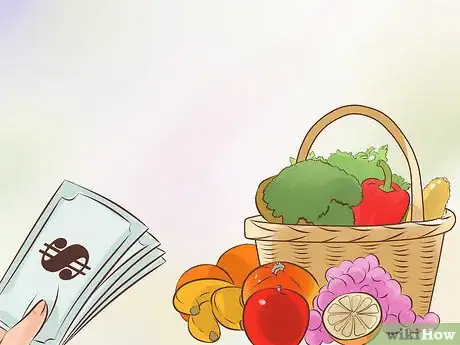
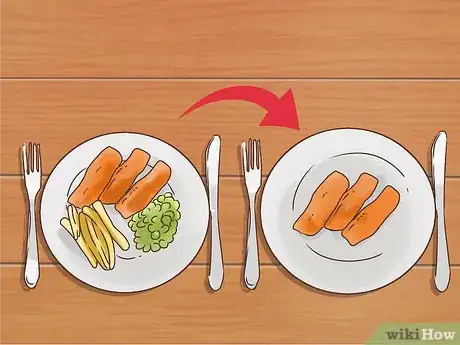
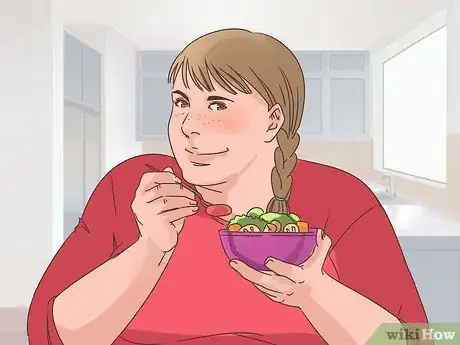

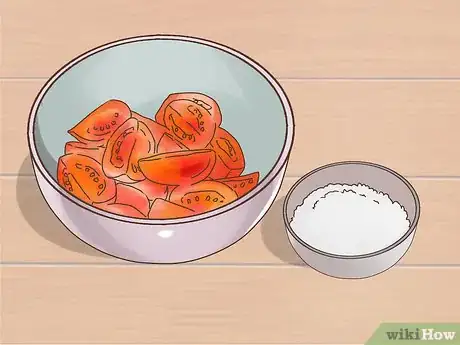
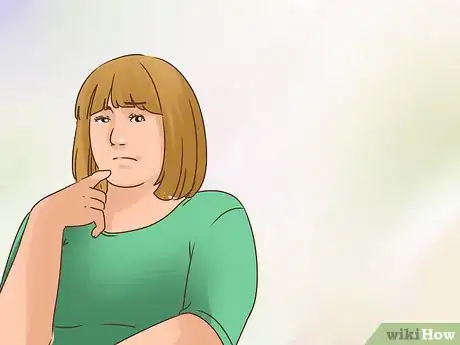
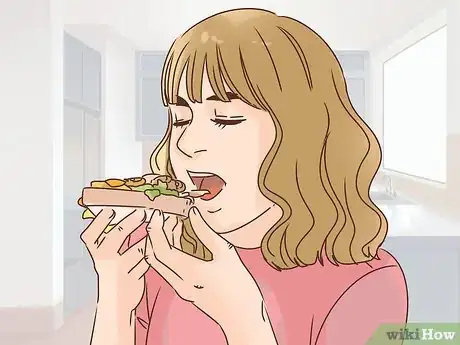
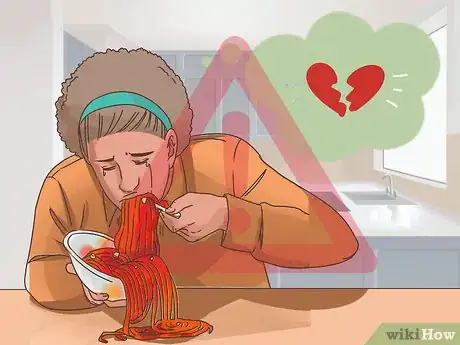
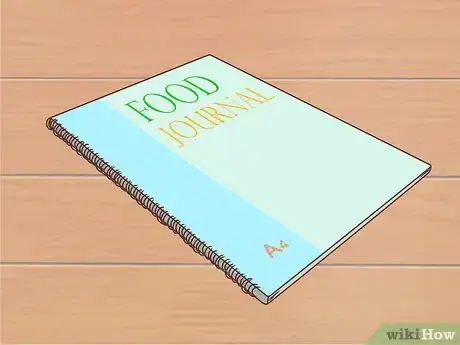
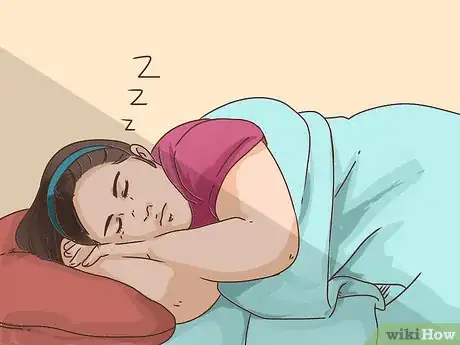
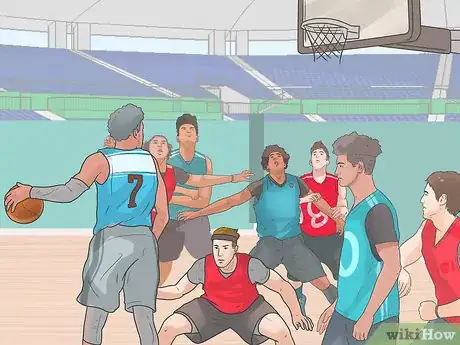

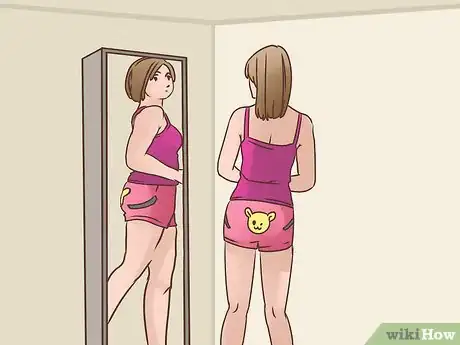

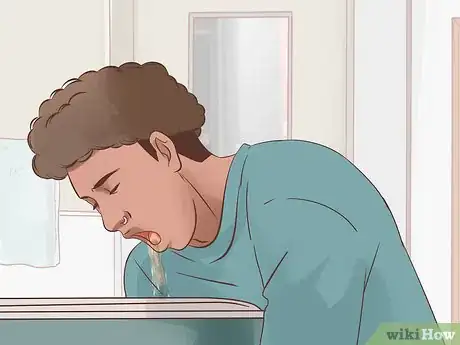
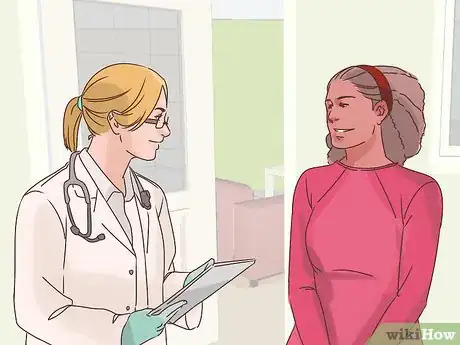


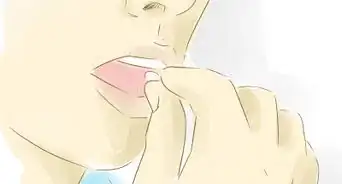




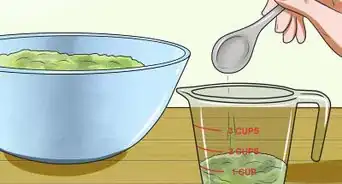
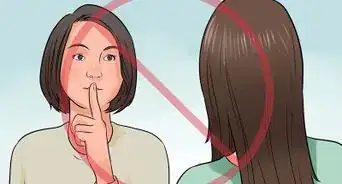
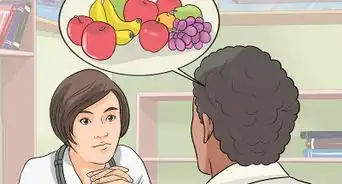

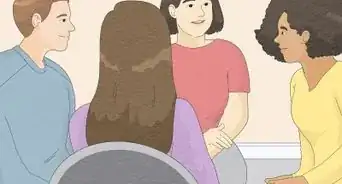
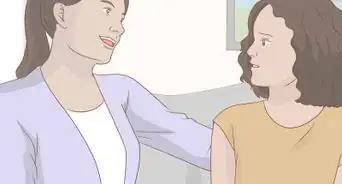
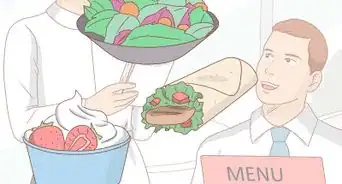






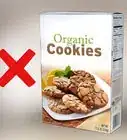
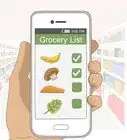
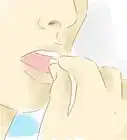
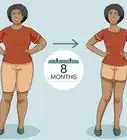



































Medical Disclaimer
The content of this article is not intended to be a substitute for professional medical advice, examination, diagnosis, or treatment. You should always contact your doctor or other qualified healthcare professional before starting, changing, or stopping any kind of health treatment.
Read More...